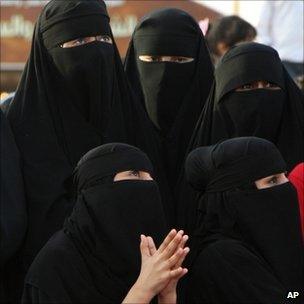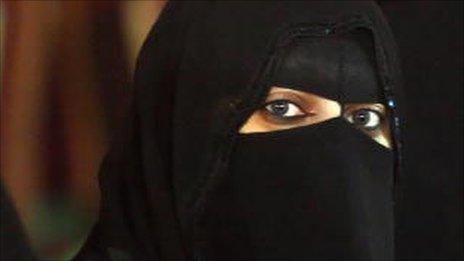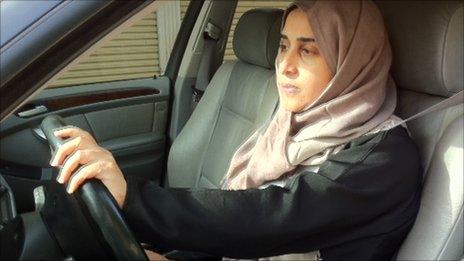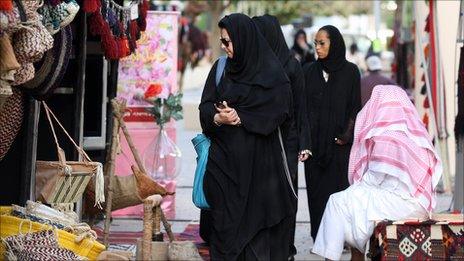First step for Saudi women's rights
- Published

Women face restrictions is all aspects of Saudi life
King Abdullah bin Abdul Aziz's announcement that women are theoretically to be given the same opportunities for political participation as men is potentially the most important advance for Saudi women's rights in decades, and underscores the king's reformist stature.
The new opportunities offered by the king seem groundbreaking. But, some observers say, in practice they may be limited by restrictions imposed by the Saudi interpretation of Islamic law.
Those restrictions include the guardianship system under which women need permission from a male relative to participate in public life.
Still, the royal declaration made in a speech before the Shura Council, an advisory body of appointed members, was hailed as historic by many Saudis, both male and female.
"I haven't been able to take my breath," said Hatoon al-Fassi, a university professor and women's rights activist in Riyadh.
"We're so excited. We believe it's the response to our demands, the first step in our long struggle to get our rights."
"I'm very happy about it," said Mohammed al-Zulfa, a former member of the Shura, who has long sought greater freedoms for Saudi women.
"The king knows what the silent majority thinks and today he told them: 'I know what you are thinking and I'm saying it now.'"
Ovations
King Abdullah's reformist stance, especially in regard to women's rights, has been evident since he ascended the throne in 2005.
In his short speech on Sunday, interrupted by several standing ovations, he made this crystal-clear. Muslim women, he said, had given "opinions and advice since the era of Prophet Muhammad".
The king added: "Because we refuse to marginalise women in society in all roles that comply with sharia, we have decided, after deliberation with our senior clerics... to involve women in the Shura Council as members."
The king said women's participation in the council would begin in the next session, in about 18 months' time.
In addition, he said women would "have the right to nominate themselves" as candidates in elections for municipal councils and to vote in those elections when they are held in four years' time.
Women, however, will not be allowed to vote in the current municipal council elections, which start on Thursday and will be held over several days. More than 5,000 men are competing as candidates in that poll.
'Real Islam'
The delayed implementation of the royal decree is likely to dampen the initial enthusiasm and excitement of many women.
But current Shura member Osama al-Kurdi said: "You have to look at the positive side of things. Women have waited [for their rights] since the early 1960s when they first began being educated. Everyone is excited here at this big news and implementation is going to happen at the right moment."
Sociologist Khalid al-Dakhil praised the decisions as "good steps in the right direction".
But, Mr Dakhil added, the moves "don't live up to the expectations of people at this time" which aim to have the Shura become an elected body with powers similar to a parliament.
He said it is likely that ultra-conservatives "will be out of their minds" with anger at the king's announcement.
But, anticipating this, the king placed his decision squarely within sharia law and Islamic history. "He's doing this in accordance with real Islam, as we know it," said Mr Zulfa. "Real Islam is getting women's rights and being full members of society."
Undoubtedly, King Abdullah's decrees will be seen as a consequence of the pro-reform movement that has rumbled through the Arab world this year.
The uprisings in Egypt, Libya, Tunisia, Yemen, Syria and Bahrain have rattled Riyadh, which has sought to dampen discontent among its citizens by disbursing financial benefits.
However, a growing slice of Saudi society still wants political and economic reforms, especially an end to corruption. It is likely that the king had this slice in mind when he made his announcement on Sunday.
Driver's seat?
It is also possible that the recently launched grassroots campaign to have the ban on women drivers lifted may have encouraged the king.
That campaign, which began in June, is continuing as individual women take to the wheel to do errands.
One of the campaign's supporters, Khulood al-Fahad, 33, a businesswoman and women's rights activist in the Eastern Province, says the king's speech caught women off-guard.
"We are all surprised by this today because we are waiting for the right to drive a car," she said. "We didn't expect this."
Ms Fahad says the royal decree only brings closer the day when Saudi women will be able to drive, because it makes the ban even more untenable.
A Saudi woman, she observes, will soon be able to sit in the Shura, "but she can't drive her car?" However a royal decision on that, Ms Fahad believes, "will not take more than a year" to emerge.
Caryle Murphy is a fellow at the Woodrow Wilson International Center for Scholars in Washington, DC. She worked in Saudi Arabia as a freelance journalist in 2008-2011.
- Published25 September 2011

- Published18 May 2011

- Published29 June 2011

- Published28 June 2011
- Published4 October 2019